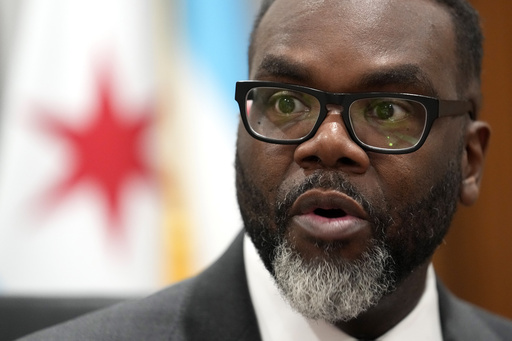CHICAGO — On Thursday, the Trump administration initiated legal action against the city of Chicago, claiming that its sanctuary city laws obstruct federal immigration enforcement efforts. The lawsuit, which also targets the state of Illinois, marks the administration’s ongoing campaign against municipalities that limit cooperation between local law enforcement and federal immigration authorities.
This latest lawsuit complements previous threats made by the federal government regarding potential criminal charges and funding cuts aimed at sanctuary cities. The complaint filed in the federal court in Chicago asserts that officials in the city and state have historically minimalized the enforcement of immigration laws, resulting in the release of numerous criminals who should have faced deportation instead.
President Trump has frequently singled out Chicago and Illinois for their strong protections for immigrants. During a visit to the city last month, key officials from the administration launched heightened immigration enforcement operations and showcased arrests made by immigration officials. The assertive tactics and rhetoric employed by the administration have faced intense backlash, being criticized for creating fear within immigrant communities and perpetuating misleading narratives about crime related to immigrants.
While several violent crimes involving undocumented individuals have received media attention, research indicates that those living in the U.S. without legal status are, in fact, less likely to engage in violent or property crimes compared to native-born Americans. Nonetheless, the belief that immigrant communities contribute significantly to crime persists as a key element of Trump’s political agenda. The first piece of legislation he enacted as president mandated the detention of immigrants accused of serious crimes, including theft and violence.
Shortly after the confirmation of new Attorney General Pam Bondi, she directed the cessation of Department of Justice grants for areas that “unlawfully interfere with federal law enforcement.” Historical court rulings have typically supported the legality of sanctuary laws, which do not permit local law enforcement to impede federal immigration actions. Similar attempts by the previous Trump administration to withhold public safety grants from sanctuary jurisdictions faced significant legal challenges as well.
California’s Attorney General, Rob Bonta, indicated that he is keeping an eye on how this directive unfolds and stated that he would take action if the Trump administration sought to unlawfully condition crucial public safety funding for local law enforcement. Connecticut’s Attorney General, William Tong, criticized the proposed funding cuts, arguing they equate to defunding the police and distract from addressing pressing public safety issues such as gun violence and the opioid crisis.
The administration has made it clear that legal standing may not deter its actions, as simply filing lawsuits may intimidate jurisdictions into retreating from sanctuary laws. Advocates for immigration reform anticipate that a variety of measures—including legislative changes, directives from Bondi, and threats regarding funding restrictions— will be employed against sanctuary municipalities. “This is going to be an ongoing attack on all fronts and in multiple agencies,” remarked Kerri Talbot, co-executive director of the Immigration Hub.
The lawsuit alleges that Chicago’s local regulations conflict with federal laws by preventing local governments from sharing immigration information with federal enforcement and obstructing immigration agents from identifying potential deportees. Chicago, which aligns firmly with Democratic policies, has been a sanctuary city for many years and fortified its laws during Trump’s presidency in 2017. That same year, then-Governor Bruce Rauner signed statewide sanctuary protections into law, marking a clash with his party.
Mayor Brandon Johnson reiterated that Chicago will maintain its status as a welcoming city, indicating that a group of mayors plans to testify in Congress next month regarding sanctuary cities. Recently, Chicago has organized training programs for community members to understand their rights concerning immigration enforcement, significantly promoting this information through public transit announcements. “The safety and security of Chicago residents remains the priority,” emphasized Johnson in a statement.
Governor J.B. Pritzker of Illinois defended the state’s compliance with legal frameworks, asserting through his office’s statement that “Illinois follows the law, unlike Donald Trump.” Pritzker criticized the federal government for complicating public safety. The lawsuit also implicates Cook County, where Chicago is located, alongside its sheriff. Cook County Board President Toni Preckwinkle affirmed the county’s commitment to being a fair community for all, while Sheriff Tom Dart defended his office’s adherence to following laws without enacting immigration legislation.




